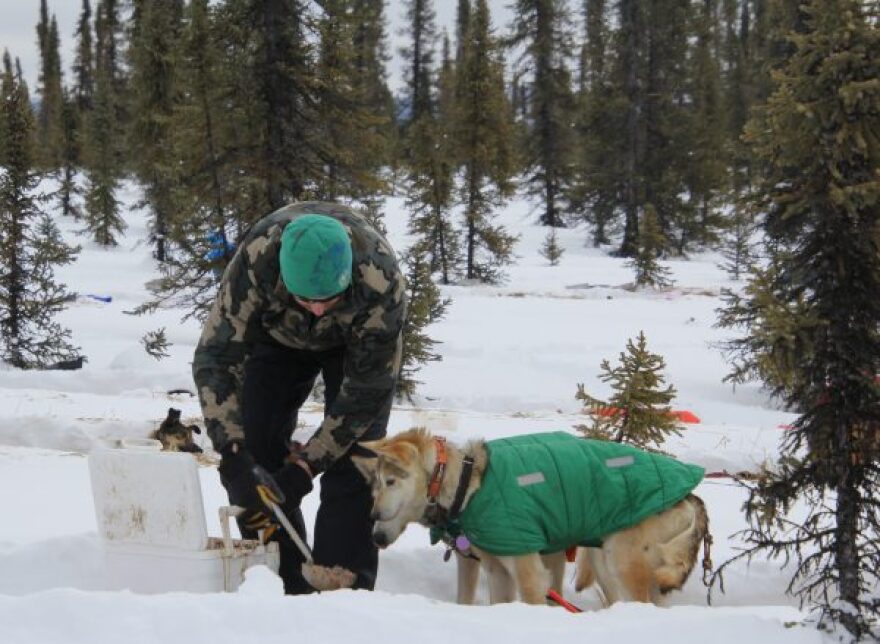Most major sporting events are sidelined by the coronavirus right now. But one is mushing on: the Iditarod Trail Sled Dog Race.
As Alaska confirmed its first case of COVID-19 this week, and state officials closed schools until the end of the month, dozens of mushers and hundreds of sled dogs continued their sprint across 1,000 miles of the state.
Race officials say they've increased cleanings at checkpoints, and postponed major events at the finish line in Nome. By Friday morning, they had not considered ending the race early, according to Iditarod chief executive Rob Urbach.
“We're doing the best we can to make the Last Great Race uber hygienic,” Urbach said.
In some ways, the Iditarod may be the ultimate form of social distancing. Teams travel hundreds of miles through rural Alaska. But, along the way, they also stop at small, remote communities that serve as race checkpoints. And with the mushers and sled dogs, come volunteers, veterinarians, race officials, pilots, reporters and mushing fans.
Some communities are raising concerns about the potential spread of coronavirus. They've closed schools to visitors and called off Iditarod-related events. Race officials have moved at least two checkpoints.
The City of Nome held an emergency meeting on Thursday and decided to cancel all of its race-related festivities, including an annual basketball tournament that brings hundreds of people to town.
The Bering Strait School District is also making changes because of coronavirus. Typically, several of the district’s schools host Iditarod fans, reporters and volunteers along the coastal section of the trail, including in Unalakleet and Shaktoolik.
The district announced early Friday that visitors can no longer stay in its schools — at least through this month. Superintendent Bobby Bolen said there are concerns about domestic and international visitors potentially carrying COVID-19.
“We hate to inconvenience people, but I think we also have to be responsible, given the state of this virus across the country, that we're also doing our part to ensure we don't spread it back to all of our communities,” he said.
Bolen said he also worries about the coronavirus spreading in rural towns and swamping the sparse health care system.
If the virus hits the region, he said: “We're gonna be hurting. I think in the long-run just by getting medical care and things like that, you know, and overwhelming the Norton South health system and the clinics.”
In Galena, messages written on cardboard and taped to the wall advised mushers that the Nulato checkpoint would be on the river, with no access to the village, including nowhere inside to sleep. The race also announced on Friday that it was moving its official checkpoint to outside the village of Shaktoolik, after consulting with the community and "in the continued interest of public health."
Urbach, the Iditarod chief executive, said the race is doing its best to minimize putting any community in jeopardy.
“Is it completely riskless? No, nothing is riskless. But I think our risk is pretty minimal,” he said. “And, you know, we are clearly fully aware of the dynamic and doing everything we can.”
Meanwhile, the N.B.A. and NHL have suspended their seasons, and the NCAA has canceled its men's and women's basketball tournaments.
The Iditarod has postponed its two big events in Nome: the mushers’ award banquet and a meet and greet with fans. And, it’s paring down its support team. Some volunteers will be flown home from the trail, and others will be asked to not come to Nome, said Urbach. This is his first year at the helm of the Iditarod.
“I understand that the streets are usually lined in Nome for the finishers. And this year, that will not be the case,” he said.

Iditarod mushers on the trail left the starting line last Sunday, before the coronavirus became a global pandemic. This week, they learned about it in bits and pieces along the trail. Some, like Brent Sass, said they’re happy to be unplugged.
“Glad I’m out here in the middle of nowhere,” Sass said during his 24-hour layover at the Cripple checkpoint, nearly halfway into the race. It’s not much more than a few tents, a cook shack and small cabins with bunks.
Kelly Maixner, a pediatric dentist, also took his daylong layover in Cripple.
“Am I worried about coronavirus out here?” he said. “No.”
The Iditarod mushers who came from overseas to race, however, are also facing new hurdles because of the coronavirus.
While he was on the trail, Thomas Waerner first learned about the U.S. travel restrictions affecting European countries, including Norway, where he lives.
He said his wife was supposed to be at the finish line in Nome, but is flying back to Norway early, worried about not being able to return home.
Waerner anticipates his challenges won’t end at the finish line. He’s got to figure out how to get himself and all his dogs to Norway.
“I think I will go to Nome first,” he said. “But I think it’s going to be a problem.”
Not everyone is choosing to continue though. Musher Jeremy Keller, who had been running in the back of the pack, scratched in Nikolai on Thursday. In a video posted on Facebook, Keller said he had decided to turn around and mush the hundreds of miles back to his family in Knik “as things avalanche globally with closures and sickness and death.”
Urbach said he will continue to consult with state health officials as mushers race to the finish line.
Related: Follow all of our coverage of the 2020 Iditarod here.
Alaska Public Media’s Zachariah Hughes contributed to this report.
Reach reporter Tegan Hanlon at thanlon@alaskapublic.org or 907-550-8447.






